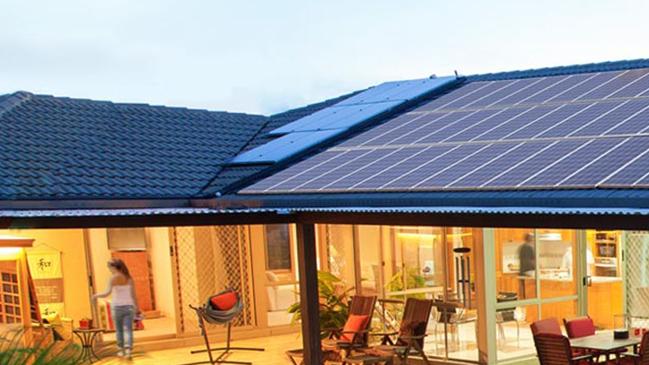Ombudsman reports rise in complaints of inverters switching off amid sun overload
An overabundance of sun is ironically not delivering returns to solar panel owners – the overload is causing their inverters to turn off.
SA News
Don't miss out on the headlines from SA News. Followed categories will be added to My News.
- Scientists develop solar tech for cloudy days
- Tesla battery saves SA $116m – and is now 50 per cent bigger
A growing number of complaints are being made by rooftop solar owners as the electricity grid struggles with an overload on some sunny days.
The grievances to the Energy and Water Ombudsman relate to inverters, which govern the flow from the home into the grid, turning off unexpectedly over voltage issues.
As a result homeowners cannot earn a feed-in tariff from their solar.
“Over the summer period, when solar panels are operating at their optimum and households are using less energy, there has been an associated rise in complaints,” Ombudsman Sandy Canale said.
“Generation of energy is moving from a small number of big generators to a large number of small producers,” said Mr Canale in his half yearly report.
“Electricity networks are increasingly managing a two-way flow of energy.”

In the first six months of the financial year, the Ombudsman dealt with 44-related complaints compared to 18 in the 12 months of 2014-15 and 22 in 2015-16.
The grid was designed for large capacity from the big generators, narrowing down to the suburban level.
Now, there are pockets with high numbers of solar at a local level generating more than is being consumed in that pocket – leading to overload.
Distributor SA Power Networks has identified the problem and is working to create a “more flexible network” including a cheap “solar sponge” rate at the middle of the day.
It also is investigating dynamic rather than default limits on how much a homeowner can export into the grid.
Mr Canale said retailers did not usually guarantee a solar owner could export power.
The Australian Energy Market Operator also is trying to improve visibility on rooftop solar. On Monday it launched the first national register of rooftop solar.
Overall, complaints to the Ombudsman have been falling for each six-month period since July 2018 with 4965 cases in the first half of the 2019/20 financial year - 267 fewer than in the previous six months.
The major issue related to billing (2225 cases). This was followed by credit management (824 cases) and service provision (747 cases).
Most billing issues were because of unexpectedly high invoices.
Mr Canale urged consumers to first contact their retailer but added that the Ombudsman was a free service which typically resolved cases within 28 days.
He said retailers had improved their customer relations.
“There has been a significant attempt by all suppliers to work with their customers to resolve issues,” he said.
The report found the big three retailers – Energy Australia, AGL and Origin – had the lowest number of complaints per 10,000 customers, with as few as 19 complaints per 10,000.
Amaysim, M2 Energy and Lumo had the highest, with as many as 57 per 10,000.
The Ombudsman was concerned by the number of customers on hardship provisions where they are paying back a debt.
At the end of September 2019, there were 16,739 residential electricity and 5685 residential gas customers on retailer hardship programs. The average electricity debt on entry was $1668 and $624 for gas.
Of particular concern were more than half of the electricity hardship customers who were paying off less than they were continuing to use, meaning their debt was continuing to grow.
“These customers are falling through the cracks of the consumer protection framework and into a debt and disconnection spiral,” Mr Canale said.
